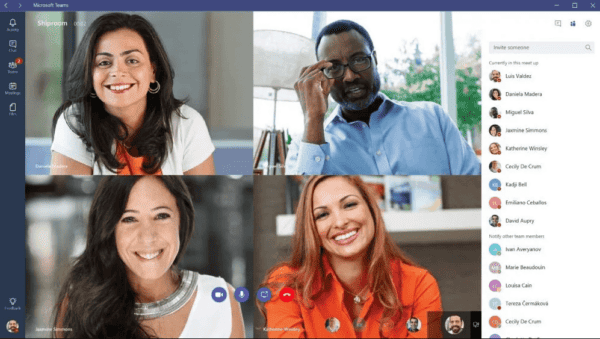Working remotely is still quite a new concept for most businesses and can still be prone to problems.
Many employees reported problems such as missing out on casual social interactions with their colleagues, and a further 67% of workers aged 18-34 said they have found it hard to make friends and maintain relationships with work colleagues when working remotely.
Establishing relationships within the workplace can be difficult for employees at the best of times, let alone when they have to do it online.
Luckily, there are a number of tools available to managers to help with this, but knowing which are the best and how to implement them successfully can be a challenge in itself.
In this post, we will provide the guidance and tools you’ll need to build those relationships and create a positive remote working culture.
The Challenges of Building Relationships When Working Remotely

Isolation
Working from home means opportunities to organically socialise in the workplace, such as water cooler gossip or coffee catch-ups, are no longer available, making it hard to establish those friendships.
This can make individuals feel isolated from their colleagues and can often leave them feeling unmotivated and disinterested in their work.
Lack Of Face-To-Face Interactions
Talking face-to-face can be a much more meaningful way to communicate with someone.
Even though when working remotely, you may be on calls where you can see each other, it can sometimes feel that just seeing someone on a screen is not enough.
You can still miss out on body language and eye contact, which are very valuable for social interaction and often lost over online calls.
Social Capital
Otherwise known as your ‘work best friend’, social capital is the benefits you and others get from the people you know.
For example, when you hit a wall with a task and one of your colleagues comes in to help you and lend their expertise to get the job done, this is social capital.
This is much more difficult to benefit from when working remotely, as collaboration opportunities are often missed.
Because working from home has limited interactions, finding your social capital of people who you can call on to help can take a long time and often leave employees feeling deflated and alone if they cannot establish those relationships remotely.
Why Are Employee Relationships So Important?
Good relationships among employees are vital for good company culture and employee morale.
Although we cannot say having strong employee relationships will make or break your business, we can say that building trust and gaining the respect of your employees can only happen if you have a good relationship with them.

Benefits Of Good Employee Relationships
- Improved Employee Retention Rate – A good relationship with your employees leads to greater loyalty and, thus higher retention rate. Employees who feel their work culture is sub-par are more likely to look elsewhere for better company culture.
- Employees Are More Motivated – Strong workplace relationships increase employees’ motivation to work harder. Part of establishing an employee relationship is recognising successes. If employees feel appreciated, they are more likely to do more and want to achieve more for the company.
- Better Employee Engagement – An engaged employee shows better results and is generally more efficient with their work, and an engaged workforce is often the result of a good employee relationship as employees feel they want to do the job, giving them a more positive relationship with work and the people around them.
The Impact Of Bad Employer/Employee Relationships
- Poor Performance – The well-being of your employees may be impacted negatively if you have a poor relationship. This could lead them to become unmotivated and stressed, both of which can result in poor performance and poor work standards.
- Missing Deadlines – Similarly, an employee with a bad relationship with their employer may become complacent with their work and become unproductive due to a lack of respect, resulting in missed deadlines which can look very bad on the business.
- Miscommunications – Sometimes, with bad employee/employer relationships, the employee may feel that they cannot go to their employer to ask questions, ask for clarity or help. This can result in miscommunications and can impact the efficiency of their work and others around them.
We created a post looking at how remote managers can monitor employee well-being, how working remotely can impact their well-being, and how this may impact relationships within the workforce.
Tools To Improve Remote Employee Relationships
Here are some tools available today to help you establish relationships with your remote employees.
Microsoft Teams (Video & IM Software)
What It Is – This is a messaging and online collaboration app built for organisations to use in real-time for meetings, online chats and file sharing.
How It Helps Improve Employee Relationships – The video call element of Microsoft Teams is a way for employees to connect and build relationships with each other by experiencing face-to-face interaction even when working remotely.
There is also a chat functionality, allowing employees to send instant messages to each other.
How To Implement It Effectively – When implementing Microsoft Teams initially, it is very easy to sign up. Once signed up, you need to choose the features you want, which will depend on your goals for the app, such as better communication, file sharing or resource access.
Once you have your features set up, running a pilot launch is a good idea to establish feedback from the app, what works well, and what features you might need to add for a better user experience.
Once implemented, it is important to ensure you have a clear onboarding process for your employees so they are able to use it effectively and to its fullest potential.

Analytics 365 (Collaboration Analytics Software)
What It Is – An essential part of the Microsoft Teams tool kit. Analytics 365 provides you with dashboards, allowing you to easily access user analytics such as collaboration, well-being and engagement.
How It Helps Improve Employee Relationships – Our tool allows managers to spot how often their employees use Microsoft Teams to communicate effectively.
Our dashboards give you insights into:
- Call Analytics – Allowing you to understand how often employees are using Microsoft Teams for 1-1 calls.
- Chat Analytics – This means you can understand how often employees send IM on Microsoft Teams.
- Employee Wellbeing – Giving you the ability to monitor overall chat sentiment, meaning you can gain an understanding of how your employees are really feeling.
How To Implement It Effectively – Our tool is an extension of Microsoft Teams, and to implement it, simply follow the link to the Microsoft Teams Store and try it today.
We have a more in-depth guide on how to get started on our website, find out more here.

Nectar (Recognition Software)
What It Is – This software provides a platform for organisations to recognise work and achievements within a business. They use rewards and point systems, along with data analytics, to provide employee recognition that helps to build company culture.
How It Helps Improve Employee Relationships – By promoting core values such as connection, empathy, alignment, recognition and trust, Nectar builds relationships among employees by celebrating each other’s achievements and encouraging others to achieve their goals for the business.
How To Implement It Effectively – Firstly, you’ll need to sign in or create an account with Nectar HR. Then to get people from your organisation using Nectar, you will need to send them invitations, and then they too will be able to use the extension and give recognitions to anyone within the team and earn points while doing so.

Survey Monkey (Employee Feedback Software)
What It Is – SurveyMonkey is a way to help a business capture feedback via online surveys, they can then analyse responses to better their organisation.
How It Helps Improve Employee Relationships – Surveys are an easy way to gather feedback, and feedback is a great tool to better relationships. With surveys, employees can feel that their voice is being heard within the organisation, which helps them to feel they are being listened to and heard.
How To Implement It Effectively – Building an online survey with SurveyMonkey is very straightforward.
Once you know what you want to ask, you can choose from various question types such as multiple choice, long format, short format and many more.
You can then email your survey to employees and check back on your account as people respond. The survey will also provide you with analytics which you can use to implement the feedback given based on the responses.

Zest (Employee Benefits Software)
What It Is – It is software that helps to implement employee benefits by managing costs.
How It Helps Improve Employee Relationships – By keeping on top of employee benefits, you can build more trust with your employees, which helps build relationships. Ensuring you provide employee benefits as promised shows that the business is reliable and puts its employees first, which is also great for improving employee relationships.
How To Implement It Effectively – Zest has all you need on one easy-to-set-up platform. Simply contact Zest, and they can set up your employee benefits platform at record speed. Once you know what benefits you want for your employees, you can enter this into Zest, and they will be able to configure this for you and have all your benefits stored and organised online in one place.

Summary
Employee relationships can be hard, and establishing them when working remotely can be even more of a challenge. But good employer/employee relationships can be the difference between someone who loves or hates their job.
Problems remote employees currently face when trying to establish relationships are,
- Feeling isolated
- Lack of face-to-face contact time
- And losing out on their social capital
These issues can potentially have a major impact on their work ethic and attitude towards their job.
So it is important as employers to make sure you are putting things in place to help improve these relationships and build a better work culture whereby your employees are excited to work, they enjoy their job and the people involved.
Some tools to help establish relationships with your remote employees include
- Zest – a tool to ensure you have all your employee benefits in one place, making them easy to implement.
- SurveyMonkey – gather feedback from your employees on how to better your relationships with them.
- Microsoft Teams – a software working to bring organisations together through better communication
- Analytics 365 – our own tool where you can use data to analyse the effectiveness of meetings and calls while tracking employee wellbeing all in one place.







